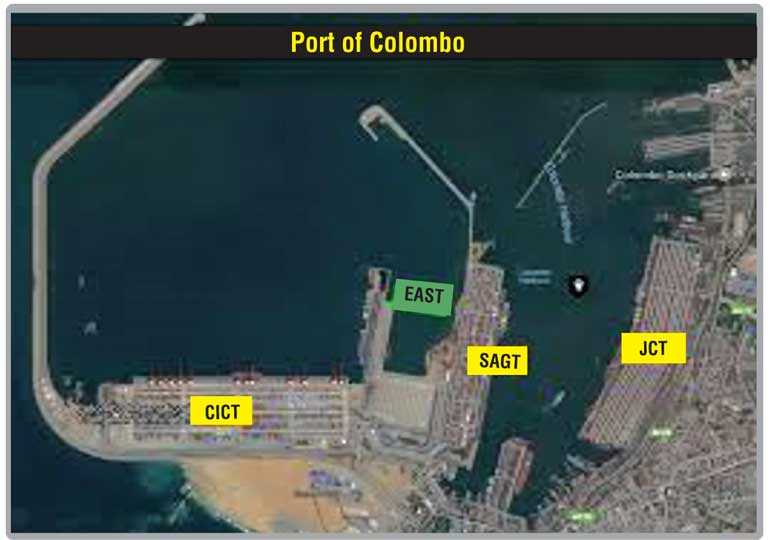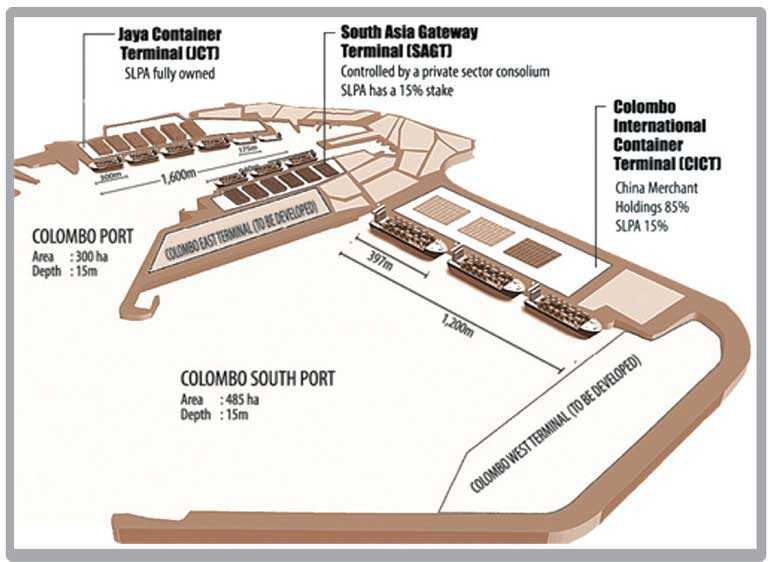Tuesday Feb 24, 2026
Tuesday Feb 24, 2026
Tuesday, 4 August 2020 00:10 - - {{hitsCtrl.values.hits}}
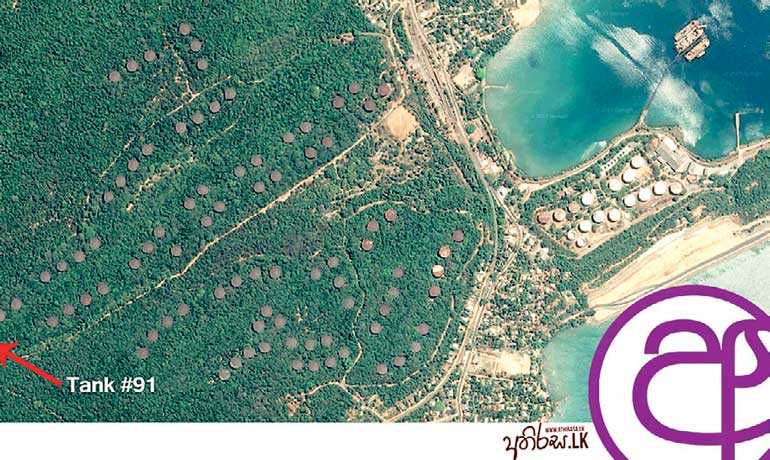
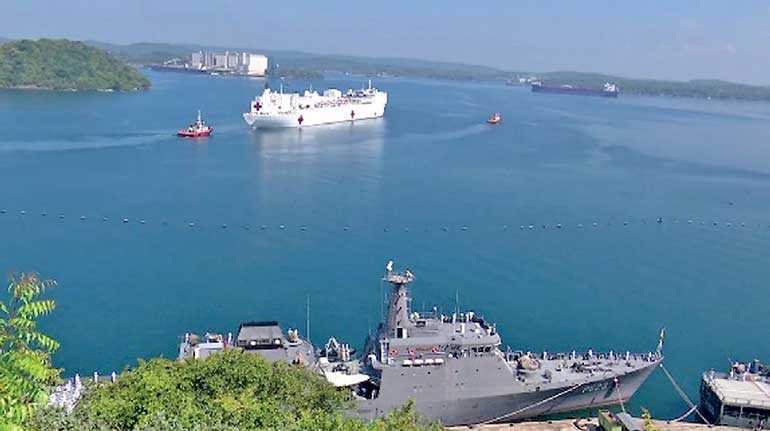
The Sri Lankan President and the government to be elected is facing a decision on either to take an extreme nationalistic view or a more liberal view on handling a crisis unfolding in Colombo in a truly global business which is shipping and logistics. Trade unions with self-interests and Buddhist priests with ignorance driven by politics have already started to ruin the reputation of the Port of Colombo by taking strike action and giving all possible wrong signals to international investors and our friendly partners around the world.
Learning a lesson from Trincomalee debacle
Many in Sri Lanka do not realise that we have one of the best natural ports in the eastern coast of Sri Lanka. But it is dead in terms of shipping activity. Wonder why? Because extreme nationalists of the 1960s killed that location to be possibly the number one energy hub of Asia. The nationalisation of the petrochemical industry and the port sector made multinational companies with technology and capital leave the shores of Sri Lanka under a government led policy which drove away foreign companies and left an empty oil tank farm to be a jungle for 72 years around the port of Trincomalee.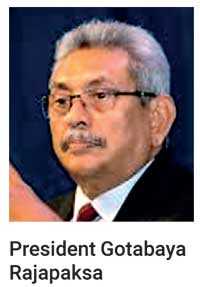
The consequences of that decision gave birth to the energy hub of Asia to be in the then developing Singapore. On the invitation of late Lee Kuan Yew, multinational companies who were asked to leave Sri Lanka pumped in billions of dollars to develop the infrastructure for the energy industry in Singapore. The multiplier effect of that energy hub development made Singapore the preferred shipping hub in South East Asia and the number one bunker supplier of the world for global companies.
Singapore government later developed a landlord model for shipping and logistics and are to date partnering multinationals as a nation to manage and develop terminals and businesses in logistics. In fact Singapore, has done away with its biggest shareholdings of its national carrier NOL, as it could not compete with scale of global shipping lines but have instead opened up its economy to international players to create wealth, employment and bring in technology to transform that nation through a collective ecosystem to a thriving modern maritime, finance and tourism centre and is successfully standing among developed nations.
Instead, the Port of Trincomalee in Sri Lanka is just handling less than 4% of the country’s cargo tonnage and is a non-active port, as policy makers failed to develop it with partners for a viable business model and a distribution hub to service Asia.
Undressing the model of shipping hubs 
Shipping and logistics are known as global businesses. A nation cannot prosper in this sector in isolation even though one has a location. Sri Lanka is a classic example for this, where for over the past 40 years it has stagnated as a regional transshipment hub depending on mainly India’s imports and exports of southern eastern states as it failed to move in great strides to embrace reforms after the initial 1977 economic liberalisation. We as a nation have utterly failed to transform the location into a maritime capital of the world simply due to wrong political decisions and protectionism. Due to these inward-looking policies from time to time, we have only driven our customers and investors out of Sri Lanka and helped our competition to pass us by many folds ahead.
A shipping hub does not happen just because it’s on an advantageous location alone anymore. A classic example is United Arab Emirates, the other major hub sitting west to Sri Lanka which is not on the main shipping route. What we need is not to re-invent the old nationalistic wheel to kill ourselves but to follow the best two examples of Singapore and Dubai for ports and shipping. The advantageous locations are created by working in partnerships with global giants who own cargo, who own mega shipping fleets, who have market access, who have competitive energy, who have the best technology and to achieve scale which will create team work and value addition for each other as well as the country. This is no more a secret if one studies globally successful maritime and logistics capitals and hubs.
Why we need to partner India
India is the most important regional cargo source for Sri Lanka. It is expected to be the world’s fifth biggest economy and probably the third by 2050. If Indian shippers and government feel that they are not appreciated for the business they provide to Colombo they will give preference to other Indian ports and regional transshipment hubs to move their cargo, then only Colombo will see the problem. The volumes that are shipped from India helps Colombo to increase its throughput attracting major shipping lines, as a result Sri Lankan exporters and importers get better freight space, better freight rates and mores shipping opportunities and scale.
Sri Lanka has already joined hands with China and local companies in operating most of the terminal capacity. Of course, due to political interference it is debatable, if these arrangements were the right mix, but to partner them was the right decision irrespective of which government took the decision. However, resisting India to be a partner and bringing in nationalism against India and Japan is the most astonishing question one could ask as India is supplying 70% of the container box volume and Japan has one of the biggest merchant shipping fleets in the world that service Colombo.
In the long run, these two partners along with China and other investors, can build Sri Lanka’s maritime capacity and convert the location to a world class hub, whereas, if we shut the doors to other international partnerships, Colombo is at risk, firstly losing out to Hambantota, secondly to regional competition.
It is indeed sad, that this picture is not given to the people of this country. It is not only the government that is at fault, but the businesses that benefit out of shipping and logistics and trade associations and chambers are not vociferous to put the right perspective in front of the nation. Instead of doing that, they have given ammunition and poison to politicians with vested interest, businesses with vested interest, unions with vested interest and finally the clergy with vested interest to write the fate of this country.
Understanding the market
Being an extremely small market, which I always call ‘smaller than the greater municipal council of Mumbai’ and less than the income of the Amazon owner, if Sri Lanka doesn’t connect to global value chains and global markets with international partners, it will only continue to protect a handful of people and cut off the road for real development and prosperity. What will be left is confusion, division, and frustration among the citizens as we have had for decades. Those who are able, will leave the country and the 72-year-old vicious circle will continue to drag Sri Lanka down the global standings as it is today in many reputable indices. It is worth to ask ourselves, do we deserve to be a US dollar 4,000 per capita economy when Singapore and Dubai have achieved USD 60,000 for its citizens whilst being behind us at the time of independence?
Mr. President, over to you
The President and the new government will certainly have to think, which direction they would want to take Sri Lanka, especially after the current COVID-19 pandemic and the changing landscape of global economics. Certainly as an individual who has been in this industry for 30 years, if the right pragmatic decisions are not carried forward and political decisions are taken on extreme inward looking nationalism listening to the whims and fancies of trade unions and the clergy, I can quite confidently say that over the next few decades, Port of Colombo is in great danger of losing business and killing itself. It will be the same lost opportunity of the Port of Trincomalee and which successfully gave birth to two competing countries which has developed two mega hubs to the west and the east of the island whilst Sri Lanka being the best located island in the Indian Ocean.
In hindsight, if the Trincomalee debacle did not happen, in my view Sri Lanka could have avoided an ethnically based separatism campaign as the economics would have neutralised political extremists in the north east.
(The writer is an economist, the CEO, Shippers’ Academy Colombo and Chairman, Logistics Advisory Committee, National Export Strategy to the Export Development Board – Sri Lanka. Currently the Director General of Sri Lanka Association of Manufacturers and Exporters of Rubber Products and former chairman of the Sri Lanka Shippers’ Council and Secretary General of Asian Shippers’ Council. Can be contacted at [email protected].)
